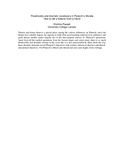| dc.contributor.author | Papadi, Diotima | |
| dc.date.accessioned | 2015-12-09T08:53:49Z | |
| dc.date.available | 2015-12-09T08:53:49Z | |
| dc.date.issued | 2005 | |
| dc.identifier.citation | Sociedad Española de Plutarquistas | en_UK |
| dc.identifier.isbn | 9788460802686 | |
| dc.identifier.uri | http://hdl.handle.net/11728/6428 | |
| dc.description.abstract | Theatre and drama deserve a special place among the various influences on Plutarch, since the theatre has a double impact. Its capacity to both offer good teaching material in its substance and good literary models makes tragedy one of the most popular sources of Plutarch’s quotations. Apart from all the explicit quotations from the famous tragic and comic poets, there is so much theatricality and dramatic tension in his work that it is not unreasonable to think about the way these dramatic elements served Plutarch’s objectives, both stylistic-rhetorical objective and ethical-educational objectives. For Plutarch’s ethical and educational aims rank highly in his writings. | en_UK |
| dc.language.iso | en | en_UK |
| dc.relation.ispartofseries | Plutarc a la seva epoca:paideia i societat;actas del VIII Simposio Espanol Sobre Plutarco (Barcelona, 6-8 de Noviembre de 2003) | |
| dc.rights.uri | http://creativecommons.org/licenses/by-nc-nd/4.0/ | en_UK |
| dc.subject | Research Subject Categories::HUMANITIES and RELIGION | en_UK |
| dc.subject | Research Subject Categories::HUMANITIES and RELIGION::History and philosophy subjects | en_UK |
| dc.subject | Plutarch | en_UK |
| dc.title | Theatricality and dramatic vocabulary in Plutarch's Moralia | en_UK |
| dc.title.alternative | How to tell a flaterrer from a friend | en_UK |
| dc.type | Working Paper | en_UK |


